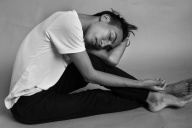Indie undercover music documentary Yangon Calling has become a surprise international hit. We met the makers.
Yangon Calling – filmed with hidden cameras by two German filmmakers in 2011 – is as much about finding a way to express yourself as it is a music documentary. The film tells the story of the former capital city’s underground punk scene, its 200 or so individuals – sporting impressive Mohawks and their DIY finest – and the music they make. In a country that has so long kept global influences at bay, punk gear is a bold public statement.
According to legend the spark for the emergence of punk rock in 90s Myanmar – at the time entirely isolated from the rest of the world – was an article about the Sex Pistols. The young Burmese Koh Nyan found a second hand music magazine at a news stall behind the British embassy, which sold print media the embassy no longer had any use for. Inspired by what he read he used connections with a number of sailors – the only people permitted to leave the country – to smuggle cassettes into Myanmar. It was a sound which struck a chord with a number of disaffected youth, despite it originating a world away, on the rainy grey streets of 1970s Britain.
& Of Other Things talked to Carsten Piefke, one half of the filmmaking team, about his experience of making the critically acclaimed documentary.
Interview by Fabiola Büchele ● Edited by Rose Arnold ● Images courtesy of the filmmakers
&: How did you find out about the punk scene, why did you want to document it and what made you think you could do it?
Carsten Piefke: We had previously made a film about hip hop in China. It’s a similar premise as hip hop is also a way for youth to express itself. What fascinated us, still fascinates us, is how young people in authoritarian regimes find a niche in which they can live the way they want to and somehow make it work. Just like with hip hop in China, punk, or at least its lyrics are subject to censorship [in Myanmar] so it doesn’t get played on the radio and you have to watch what you say. These young people really take a risk for what they believe in. Perhaps they are not fully conscious of it, but regardless. I find that incredibly impressive and you start asking yourself if you would do the same. Would I be the one who stands up and says screw the dictatorship or would I stay in line, shut my trap and make sure I don’t get noticed? That really interested me.
&: Where there any particularly difficult situations with filming there?
Carsten Piefke: That’s difficult to say. I – and I think the same goes for Alex – got more paranoid the longer we were there. You start imagining things. Looking back I can’t say if it was all in our head.
At the time [in 2011] it wasn’t possible to enter Myanmar as a journalist and move about freely. Journalists would be met at the airport by a minder who checked what you were getting up to the whole time. Myanmar didn’t have the best reputation when it came to handling journalists.
We shot on a HDV cameras. For one that allowed us to move about with more ease you don’t have to schlepp about ten thousand things and you don’t draw as much attention as every tourist has a camera and is filming everything. That’s why it was important to film on the streets to not be conspicuous in the hope that people would just think oh well tourists.
It’s being part of a group, but still take a stand against society. You show and say that you have no intention of joining the way of life of the majority of the population.
&: What is your personal fascination with subcultures?
Carsten Piefke: For me it’s being part of a group, but still take a stand against society. You show and say that you have no intention of joining the way of life of the majority of the population. I don’t want to live like them, I want to live like me. You want to distance yourself from society and perhaps find a sort of family that isn’t your actual family but with who you feel a kind of kinship.
&: Is the message of the Myanmar punks being heard?
Carsten Piefke: Well, I think the situation has changed since we were there. When we were filming they were kind of perceived as just freaks who look weird, but we’ve stayed in touch on Facebook and there have been articles in the Burmese media and somehow it’s starting to get noticed. One of the bands played for the students during their protests and the international attention has probably helped whatever influence they have.
The band Side Effect has been in Germany twice already and in the US once. With the help of crowdfunding and the Goethe Institute we managed to pay for their flights the first time and they crashed at mine. Their concert in Berlin was sold out and I really hadn’t expected them to go down so well.
&: Were there any instances with making the film where things were lost in translation?
Carsten Piefke: We had one scene, which actually didn’t make it into the film, but it was a 20 minute, half hour discussion between some punks we filmed and when we got the translation we realised that what they had been saying to each other was pretty brutal, including threats to kill each other and what not. They were pretty drunk and basically told each other what idiots they are, which really didn’t seem like it at the time. And of course had we understood what they were saying we would have filmed it differently than if you don’t understand the context. That was a strange experience.
If you’re only there for six weeks there are certain limitations to how deep you can get into the politics of a country. You can only hope that you haven’t made total blunders that will be uncovered when the film is finished.
&: Did that raise the question of who should be telling these stories? Did you question your own role?
Carsten Piefke: That’s double-edged. Our film is of course made from a western point of view. Of course a film like this would be better if it were made by Burmese about their country and their scene. Actually there are some films being made and I have seen quite a few and that has been super interesting. They of course have an entirely different access and approach to the whole thing. And if you’re only there for six weeks there are certain limitations to how deep you can get into the politics of a country. You can only hope that you haven’t made total blunders that will be uncovered when the film is finished. On the other hand it was important to us to make it and get people [outside of Myanmar] interested in a topic like this because it puts the whole situation into focus.
&: Who is the film for? Did you have a specific audience in mind or is it more a personal project?
Carsten Piefke: The idea was a film for young people who are interested in pop-culture and to give them an understanding of a critical situation in a country that wasn’t really on their world map before. But also to make a film that you would want to watch yourself. My mother on the other hand probably wouldn’t find a way to relate to these guys.
Then it was shown at various film festivals in Singapore, Indonesian, Korea, Japan. We were really stoked that we were reaching members of other Asian sub-cultures with a film which we had intended for a western audience.
&: How important is it to tell these stories that really are about a quite small minority?
Carsten Piefke: It is essential to show these things in the West to question certain clichés. To put it quite simply when people hear Vietnam they think Charlie and Viet Cong, for Cambodia the people who are bit more politically savvy go straight to the Red Khmer and otherwise to the beach, but that is of course not all that there is to these countries. They are made up of the individuals who live there and there isn’t The Chinese and The Burmese or The Vietnamese. Just like in Europe these are cultures that are made up of multiple layers.
●●
Yangon Calling will be screened as part of the Onion Cellar’s Sounds by Southeast film festival on 17 June at 8pm at Cama ATK.

















